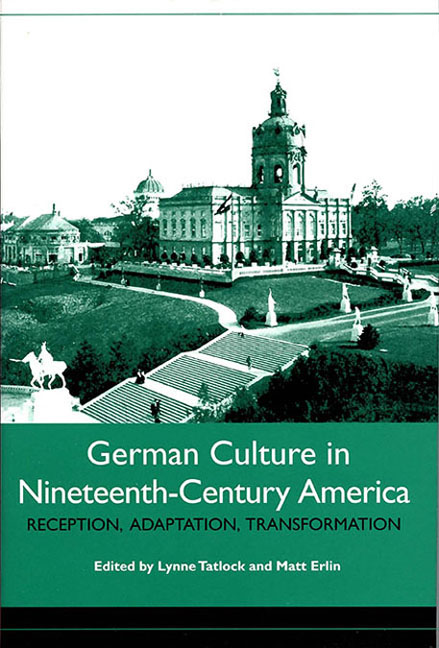Book contents
- Frontmatter
- Contents
- List of Illustrations
- Acknowledgments
- Introduction
- 1 Cultural Politics at the Turn of the Twentieth Century
- 2 In Pursuit of Intellectual Culture
- 3 Translation American Style
- Domesticated Romance and Capitalist Enterprise: Annis Lee Wister's Americanization of German Fiction
- Pictures of Travel: Heine in America
- Retroactive Dissimilation: Louis Untermeyer, the “American Heine”
- A Tramp Abroad and at Home: European and American Racism in Mark Twain
- 4 Immigration and Naturalization Acts
- Contributors
- Index
A Tramp Abroad and at Home: European and American Racism in Mark Twain
from 3 - Translation American Style
Published online by Cambridge University Press: 13 April 2017
- Frontmatter
- Contents
- List of Illustrations
- Acknowledgments
- Introduction
- 1 Cultural Politics at the Turn of the Twentieth Century
- 2 In Pursuit of Intellectual Culture
- 3 Translation American Style
- Domesticated Romance and Capitalist Enterprise: Annis Lee Wister's Americanization of German Fiction
- Pictures of Travel: Heine in America
- Retroactive Dissimilation: Louis Untermeyer, the “American Heine”
- A Tramp Abroad and at Home: European and American Racism in Mark Twain
- 4 Immigration and Naturalization Acts
- Contributors
- Index
Summary
The trouble begins at eight” — this was the famous warning Mark Twain posted on the advertisements for his platform lectures. Of course it is facetious, a hook to pull in bourgeois audiences attracted by the subversive frontier — it hints at the risk of dead cats and rotten tomatoes flying through the air. But at another level the warning is serious. Stirring up trouble was and is a part of Twain's performance, both onstage and in his literature, and one of the most obvious troubles in Twain's work is race. In his study on Twain as performer, Randall Knoper observes, “Living in a white male culture that had plenty invested in brutal racisms as ways of excluding and subordinating [other races], Mark Twain yet . . . raided race-associated language and behavior . . .; as a white male ambivalent about bourgeois norms, he transformed African-American tactics of resistance . . . into his own, in effect using race to attack his parent culture and to articulate his relationship to it.”
For Knoper “parent culture” refers to Mark Twain's American, white, southern, middle-class origins. Like most scholars of American culture, he leaves aside Twain's relationship to Europe. But if we look at Twain's art from 1867 to 1899, from his breakthrough with Innocents Abroad, to A Tramp Abroad, to The Prince and the Pauper,to A Connecticut Yankee in King Arthur's Court, to Joan of Arc,to his dark Austrian novella “The Mysterious Stranger,” it seems unassailable that Twain's ultimate parent culture is Europe. Further, Samuel Clemens lived in Europe for about twelve years of his life in total, including the nearly two years in Vienna — from the fall of 1897 to spring of 1899 — that will form the focus of my paper. A look at his work makes evident that Samuel Clemens, the person who invented, performed and eventually became Mark Twain, developed as ambivalent a relationship to his European heritage as he did to his southern roots. Once Europe is added to our understanding of Twain's cultural self-construction, we must also consider Twain's relation to Jewishness much in the same light as we consider his relation to Blackness. In the context of the late nineteenth century and early twentieth century of Twain's lifetime, Jewishness and Blackness are racial categories with which he identifies and is identified.
- Type
- Chapter
- Information
- German Culture in Nineteenth-Century AmericaReception, Adaptation, Transformation, pp. 233 - 246Publisher: Boydell & BrewerPrint publication year: 2005



